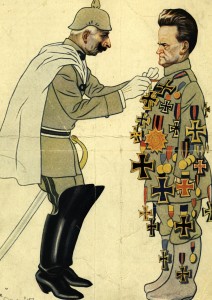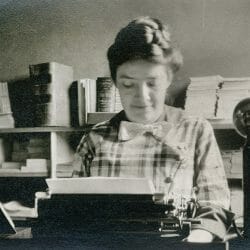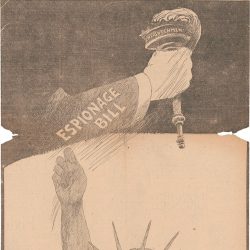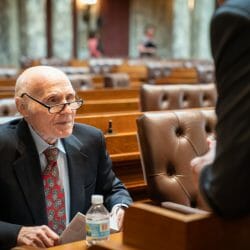Politics and Persecution

After Wisconsin Senator Robert La Follette helped kill a bill to give President Woodrow Wilson the authority to arm U.S. merchant ships, this cartoon identifying La Follette as a pro-German traitor appeared on the cover of the December 13, 1917, issue of Life magazine. WHS image id 3272
The UW was eager to show its loyalty to the cause in part because of sharply divided opinions about the war that drew unwanted national attention to the state.
In 1917, nine of Wisconsin’s 11 Congressmen and Senator Robert La Follette 1879, the face of the Progressive movement, voted against the U.S. declaration of war. La Follette’s position was straightforward and unwavering but devastating to his national reputation: he stuck with President Woodrow Wilson’s 1914 declared policy of neutrality, asserting that the war had little to do with American interests.
For his opposition to the war, La Follette was repudiated by a majority of the UW faculty in a resolution that deplored “his failure loyally to support the government to the prosecution of the war.” Nearly all the faculty signed it, including La Follette’s friend and UW President Charles Van Hise 1879, 1880, MS1882, PhD1892.
But the taint of disloyalty continued to haunt the campus. On April 6, 1918, Princeton history professor Robert McNutt McElroy addressed students in a lecture at the Stock Pavilion as a representative of the National Security League, an organization that advocated military preparedness and “Americanization” of immigrants. The students, McElroy told the New York Tribune, “sat with folded arms, staring wearily up at the ceiling. From time to time they’d turn and look at each other and smile superciliously, sort of pityingly. There was a good deal of fidgeting and shuffling of feet.” When he couldn’t take it any longer, McElroy leaned over the lectern and seethed, “Do you know what I think of you from your conduct tonight? I think you’re a bunch of damned traitors!” McElroy declared the students disloyal in several interviews after his lecture.
President Van Hise and Wisconsin Governor Emanuel Philipp demanded retractions from the National Security League, but none came, so defenders of the university wrote letters to the editor to refute McElroy’s charges. The students had marched more than two miles in the pouring rain and had grown restless because they were cold and wet, they said. Several of the students had, in fact, received medical attention for their extreme chills.
Many Wisconsinites were keenly sensitive to charges of betrayal due to the publicity surrounding La Follette and the state’s German immigrant population. German Americans, one of the largest immigrant groups in the state, maintained a strong cultural unity based on pride in German accomplishments, and in Milwaukee, in particular, German immigrants largely drove the city’s cultural and economic life.
But during 1917 and 1918, German culture became suspect. An editorial in the Wisconsin State Journal on June 22, 1917, called for the UW to be “Americanized,” citing the large number of German teachers as evidence meriting suspicion. That fall, enrollment in German classes fell off nearly 43 percent while French and Spanish language enrollees increased. The German department staff was harassed and put on the defensive, and one member — a German national — resigned while the rest remained largely silent or supported the war. German teachers in the Wisconsin Association of Modern Foreign Language Teachers adopted a resolution in 1918 to work to overturn suspicion, which read, in part, “ … we must prove by word and deed, in the class room as well as in public and private life, that the sympathetic and effective teaching of the language and literature of our present enemy is in no way incompatible with the most whole-hearted Americanism.”
The UW’s German department shrank from 25 faculty teaching approximately 1,400 students during the 1916–17 school year to eight providing instruction to 275 students. It continued to suffer after the war as many high schools failed to reinstate German courses.
Published in the Spring 2017 issue



Comments
No comments posted yet.